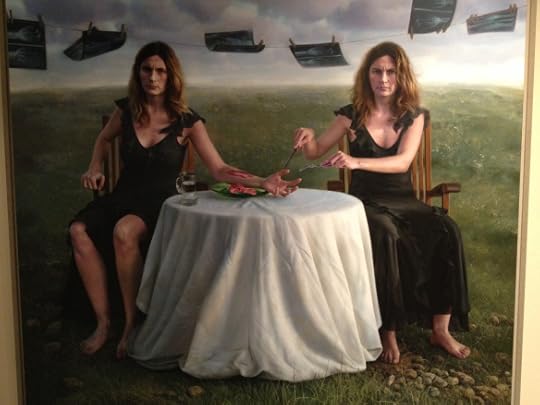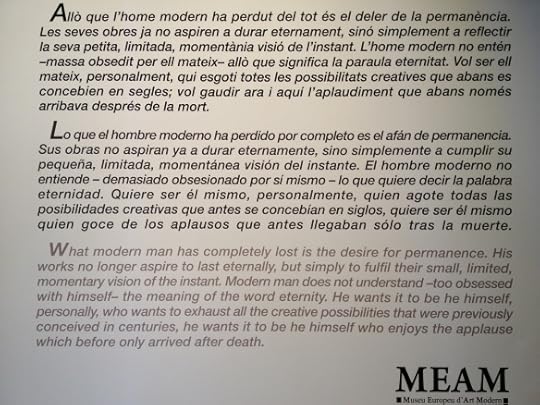Robin Wildt Hansen's Blog, page 2
January 20, 2013
Journal of a Literary Traveller 2: Beautiful Café in Barcelona
Today I visited one of the most beautiful cafés I have ever entered.
I spent all week working on my new novel and hardly talking to a living soul. I found my resulting hermetic and dopaminergic state of mind highly conducive to writing, but when the weekend arrived I told myself it was time to visit the outside world.
So last night I went to a bar.
Well, that is to say, most of the evening saw me sitting in my cold flat wearing two sweaters and a blanket, drinking tea, chattering my teeth and procrastinating with Youtube videos, reasoning that I couldn’t go out because I don’t know anyone in Barcelona.
In the end, however, I became so hungry that I managed to boot myself out of the door to search for food.
After eating, I forced myself into a bar. I was feeling seclusive and sleepy, and I didn’t want to be there. But I forced myself to talk to strangers. As a man, no one will seek you out. Your entire life can pass without anything happening except for winning second prize in an online game tournament or something. If you want to see the world you must take initiative. I had an image in my mind of Barcelona remaining closed to me as I work on my novel, and that when I leave in a couple of months, I will only know the route between my apartment and the supermarket. I was determined to destroy that image. So I looked around, opened my mouth and said whatever came to mind.
The first people I talked to were not very friendly. But as I got used to the environment, I started to relax, and conversations came naturally.
In several conversations I admitted to having written at Starbucks for the last two days because the boiler in my apartment has broken and there’s no heating or hot water. I knew it was not a fashionable thing to say, and indeed I did get chastised. “Why do you go to them and their crap coffee,” one guy told me. I looked at him, not knowing what to say. There was a pause in which we looked at each other. “We Australians don’t like chains,” he said, as if to explain himself.
“I haven’t found any other café with suitable tables and not too much noise,” I answered, feeling that my words sounded like I was apologising, although I didn’t mean to.
It is important to state things as they are, however. Even if I’m not sure I’m happy with something I’m doing, I try to make myself state it. At least among people whose opinions of me is of zero consequence to my life. Because only when things come to light is it possible to work with them.
So I persisted. And indeed, the next person I talked to, a Spanish film director, said: “No, no, no! I’ll tell you where to go!”
And so it was that today I found myself entering the Cafe d les Delicies. I was blown away by its beauty and atmosphere. Yes indeed I think I will write there more than once. Pictures are below.


January 13, 2013
Journal of a Literary Traveller 1: Figurative magic in Barcelona
I wonder if you know the feeling. It’s a sentiment of having had your expectations disappointed throughout your whole life to the point that you start to think that what you had been waiting for simply does not exist. And then you find that it does. This is how I felt today.
I took Sunday off from working on my upcoming novel to explore the surroundings of my new writer’s base in Barcelona. It was as I wound with the streets of the Old Town, filling my belly with tapas, cakes and coffee, that I chanced upon the Museu Europeu d’Art Modern. Not being a great connoisseur of art, I must admit I was torn between art and chocodiles. But my stomach was full to the point of bursting, so I chose art over chocolate. This time I was not disappointed.
Most of my life, modern art has been a disappointment to me. Exhibits were usually so abstract it was hard to tell whether the artist himself had any idea what he was trying to express. The evasive opacity of museum texts and articles only confirmed my doubts. These experiences are possibly a function of being a native of Copenhagen, Denmark, but I suspect they express a wider phenomenon.
In so-called literary circles I encountered the same tendency. Now this probably is a more local phenomenon. I would attend readings where poets would present works without rhyme or metre. This was supposedly in order to write in a modern style; but it was pretty obvious that these people would not be able to compose a poem with rhyme and metre, nor even a single page of prose without severe spelling and punctuation mistakes.
It was therefore a magical experience for me to visit the current exhibition at Museu Europeu d’Art Modern. The works are figurative yet magical, and obviously took great skill to execute. And then there are the museum texts.
As a former translator of museum texts, I know how neutral these texts often are. In fact they can be so neutral they become meaningless. Not so here. Whoever wrote them is actually saying something. He or she is making statements that some people would find objectionable. That means they are real statements.
Despite it being Sunday, I only saw two other visitors in the entire museum. The personnel stayed around the entrance. So I was alone with the paintings throughout my visit. I did not feel alone. These paintings are supra-real; they seem more real and alive than their motifs themselves must have been.
I spent the first part of my time in the exhibition simply being and enjoying. The second part I spent taking a few pictures. They are below:


November 20, 2012
Ethics: the way to personal power (3)
The Golden Rule
“The fox provides for himself, but God provides for the lion.”
- William Blake
This is part three in a series of blogs about how personal ethics can help you become indestructible in an increasingly chaotic world.
I ended the last instalment by asking how you may construct an ethical code and what it will do for you. Let’s start with the second part: what it will do for you. This is an appropriate point of departure, because your ethical code comes from your inner core. So there could be no more solid foundation for it than what your inner core wants.
How do you envision your ideal life? This question may sound dreamy and frivolous to you; if it does, then this is part of your challenge: to unlearn the edict that you were perhaps brought up with, and perhaps programmed with by the society or culture in which you grew up: that “real life” and your dream life are two completely different concepts that can never meet.
Getting to know your ideal life is probably the single most important thing you can do on your way to discovering your own ethical code. Because even if you ignore your vision of your ideal life, as many people do, it will continue to lurk in the shadows, and will be the true standard against which your soul – as opposed to other people and your super-ego – will measure your actions. This shows you how important it is to know. Because if you don’t, you will probably just continue to violate your own standards and ignore what your intuition is telling you, because you don’t understand why your intuition is telling you to do a certain thing or to not do a certain thing, and everyone around you is demanding that you must be able to rationally defend your decisions. Under such circumstances, inner peace is impossible, because you don’t even know what standards you are striving to live up to.
So take some time to really get to know your ideal life. What does it look like? How does it feel? Who are you with? What do you have in your life? What mission are you pursuing?
Now ask yourself what kind of person you see leading this life. Are you that person, as you are now? Is your behaviour in tune with your vision? Or do you need to make some modifications?
And this is the key. Because the powerful way to get something is not by stealing it but by receiving it because it naturally belongs to you because of who you are.
It is really this simple. As soon as you congruently implement this course of action, mysterious things will begin to happen to help you achieve the life of your dreams.
Don’t be the fox who thinks the world is so complicated that he must take what is not given if he wants to survive. That path leads to fear and self-hate.
Be true to your lion heart.
God will give you the lion’s share.


November 8, 2012
Ethics: the way to personal power (2)
From Within
“The apple tree never asks the beech how he shall grow; nor the lion, the horse, how he shall take his prey.” – William Blake
This is part two in a series of blogs about becoming indestructible in an increasingly chaotic world. I currently refer to this indestructibility as “personal power” because it makes you powerful within rather than giving you power over other people. This is not a term that I have invented, but it is useful for the present exposition.
I concluded part one of this series by discarding morality as a source of personal power. I defined morality as behavioural codes that your parents, society, or the culture you were brought up in, want you to adopt to the extent that they become internalised edicts about what is right and what is wrong.
I showed how these edicts drain us of power because we invariably break them and then cover our infractions with explanations that we know won’t stand up to the light of day. This is how morality turns us into base, frightened people who shun the light and even our own shadow.
Is that who You want to be?
What is more attractive to you, and what do You feel is strongest and most indestructible? Truth or lies? Double-standard explanations or straight talk?
I knew you would say that. I knew it because we all instinctively recognise the power of someone who is being authentic. Ok then, so why are you on the side of the lies and double-standard explanations?
Well, it’s not as easy, not as simple as that.
The fact is, for most of us grown-up people, authenticity is a lofty and challenging goal. Our lives have become too complicated to match the blueprint we adopted as children or live up to the morality we were inducted with.
It seems to be a strange state of affairs. Most of us are not murderers or grand-scale criminals. So why do we feel so guilty that we prefer to live a lie rather than simply being who we are? And what is the answer to our predicament? Do we simply need to redouble our efforts to lead a moral life? Well, in order to rectify a symptom we need to understand its causes.
The reason almost all of us are in breach of morality in this world, the reason almost all of us are either struggling morally with ourselves or lying to ourselves and others, is that whichever moral code we were implanted with, it did not originate from within our own hearts. It is incompatible with who we are, no matter how well we may have internalised it.
So here is the key: the way to personal power is to have and observe a code that originates from within Yourself. I will call this code Ethics, and its observance living an ethical life.
So how do you construct such an ethical code and how do you observe it? How does an ethical life protect you, and what sorts of effects can you expect to encounter if you choose this path? These are some of the topics of the next installments in this series.


Ethics: the way to personal power (1)
The lives of others
“As the caterpillar chooses the fairest leaves to lay her eggs on, so the priest lays his curse on the fairest joys.” – William Blake
As a child, it always seemed to me that people who spoke of morality were trying to impose rules on lives they knew nothing about.
I would hear not only that I should behave in a certain way, but that we all should. It used to be a favourite sport of mine to unveil behaviour among such proponents of morality (usually teachers or writers of children’s books), that would contradict their own edicts.
To me there was something intrinsically unpalatable about morality as it was served to me; the idea that someone who didn’t know or understand me would know what was best for me just seemed too much of an imposition. I felt that as a child I was powerless to resist the fixed idea that most grown-ups seemed to share: that children are put into the world to be patronised.
Then I myself grew up. Morality was no longer preached to me to nearly the same extent; it was assumed that I would have internalised it by now. And indeed I had, to a very great extent. To my own detriment, I might add.
Dear reader, please note that I am writing about myself to bring you closer to me, to allow you to see parallels between the process of your own mental configuration and mine, without me imposing my conclusions on you. Please note that as I write about myself it is You I am attempting to reach.
The idea I am trying to expound is that morality – the values of others – is imposed upon us, and that we grow up taking certain behaviours for granted while rejecting others as unacceptable. And then we wake up one day to find that we are practising those very behaviours that we reject.
Our explanation in such cases must be that the behaviour in question is generally unacceptable, but that in this special case it is understandable or perhaps even necessary. However, such explanations always feel unsatisfactory; we mumble them to ourselves and perhaps to others, but we have a feeling that they will petrify and crack if exposed to the full light of day.
In other words, such double-standard explanations make us afraid of the light, afraid of the truth. They make us creep about, uncomfortably aware of our own shadow, and it just won’t go away. In short, they make us weak and divided. That is not the way to personal power.
So what is?
For the answer to this question and more, please see the next installment.


February 5, 2012
Repose
My god and I would travel miles
To worship at your feet
To rest my starving, trembling hand
On your leg – you feel the secret tongue of my hand,
Dissolving in these eyes of heat??
The animal that ends my arm
The beast you do not see but feel
Your real, singing thigh can calm
For in your heart I’ve found my meet.
I travel will in any year
In any day or hour
I travel will to any land
To give you this white flower.
And even if the wait is bland
Our ride for but an hour
I’ll sit down by your blessed side
And rest my starving, trembling hand.


February 4, 2012
Entrenched
It was only after several trips to Romania that I accumulated the perspective and necessity to write a novel about Denmark, the country where I grew up.
As a schoolboy in Denmark, I was taught that I was extremely fortunate to be born into the best society in the world.
I remember a lesson in which our teacher told us that the Americans were vulgar because of their obsession with things being as big as possible. We Danes, on the other hand, were wise enough to be content with our Little Mermaid. The British had delusions of grandiour, because they had not yet realised that they were no longer a great power. We Danes, however, did not think of ourselves as grand. This made us very grand. Our neighbours, the Swedes, were very restrictive about everything, and the Germans were severe. But we Danes were liberal, and wouldn’t dream of forbidding anything. The Norwegians were just plain silly, as their funny intonation clearly demonstrated.
Apart from these countries there were the communist dictatorships and the starving Third World. Denmark was against nuclear power, supported Amnesty International and contributed more than its share of development aid.
(Since then, things have changed. Danish troops were among the first to land in Iraq, Denmark has distanced itself from Amnesty International because the organisation has pointed to a growing trend of human rights abuses in Denmark. And the Danish government has cut development aid contributions. But that is a different, albeit related, story.)
I learned that Denmark was the only country in the world that was governed by rationality and modesty rather than cultural customs and illusions of grandiour.
As I grew up, of course I did not literally believe these things I had learned at a young age. However, it is a worldview that is so pervasive in Denmark, it is written in between the lines of every document, every news broadcast and every regular person’s conversation. So I believed there was no such thing as Danish culture; I believed that Denmark was simply a rational society, the benchmark of normality against which the quirkiness of foreign cultures was apparent.
That was when I went to Romania. And as it turned out, it was this country, that is so obviously not perfect, that was to make me aware of the imperfections of my own country.
The first thing I noticed in Romania was the dynamic interaction between the sexes. I saw men being comfortable with being men and women being comfortable with being women, even to the point of turning it into a fine art. This showed me by contrast how in Denmark men and women are taught to be ashamed of being too masculine or too feminine.
Romania was the first place I heard the word “man” used in a positive sense. And it was only when I had that experience, that I realised that it was truly the first time.
Don’t get me wrong. It’s not that men are second-class citizens in Denmark. But masculine values are feared, ridiculed and suppressed. So if you are a socialised man with only feminine values (except perhaps harmless enjoyment of sports) you’ll be all right. But if you are so passionate that you cannot, will not suppress your masculine values, then you’re in for a hard time. However, most people are able to socialise to the point of zero friction with society. It takes a very passionate individual to hold on to something against the constant edicts of society, media, family and social group. So most Danish people simply will not understand what I’m talking about here. That is OK; I’m writing for those who do.
The pivotal point in my Romanian education came when I was the guest of four young people in Cluj-Napoca. Claudia, Călin, Oana and Mircea were such good hosts to me, I felt I must refuse at least some of their kindnesses. I was not used to anyone treating me with such kindness and hospitality, let alone people I had just met. The situation was so unfamiliar; I was confused, and my refusals were halfhearted and insecure while my hosts were completely self-assured in their hospitality.
When I was a child, my father had taught me to refuse the offers made by hosts because, as he said, “they don’t really mean it”. But I could tell that these Romanians meant it, to the point of not taking no for an answer. I was having a reality meltdown. I often felt dizzy and my vision blackened. It was so difficult for me to accept my hosts’ kindness. And yet I had nowhere to run, because deep down I liked it there with them, and I wanted to be there. I wondered why it was so difficult for me to receive, and in the end I had to realise that it was because it would not even have occurred to me to host these people if they had come to Denmark. And if somehow they would have come to stay in my apartment in Copenhagen, I would not have been thoughtful like they were. So many things simply would not have occurred to me. So I felt ashamed all the time. I felt like the lowest of the low. And then one day I hit a breaking point. I simply accepted their kindness, and I melted because there was nothing else I could do.
The fact that I capitulated to the kindness of my hosts meant that I was no longer able to withstand the insights that permeated the situation. I saw how in Denmark we run from any kind of commitment, even towards family members and close friends, not to mention new acquaintances. Economically, Denmark is one of the richest countries in Europe while Romania is one of the poorest. But spiritually, how poor we Danes must be if we cannot afford to give or receive.
These are the themes of my novel, Entrenched, which I felt compelled to write when I returned to Denmark: a culture which has no sex flow because the gender polarity has been wiped out, and has no flow of giving and receiving, because the people have become frightened, entrenched units, is a culture that has stagnated and is dying.
But a revival is possible. In the following chapter, “Help a Dane Day” a group of foreigners set out to trick the Danes into giving and receiving. One of them is a woman who gives a Danish man a lesson in gender polarity.
Entrenched is available from an Amazon near you.


































